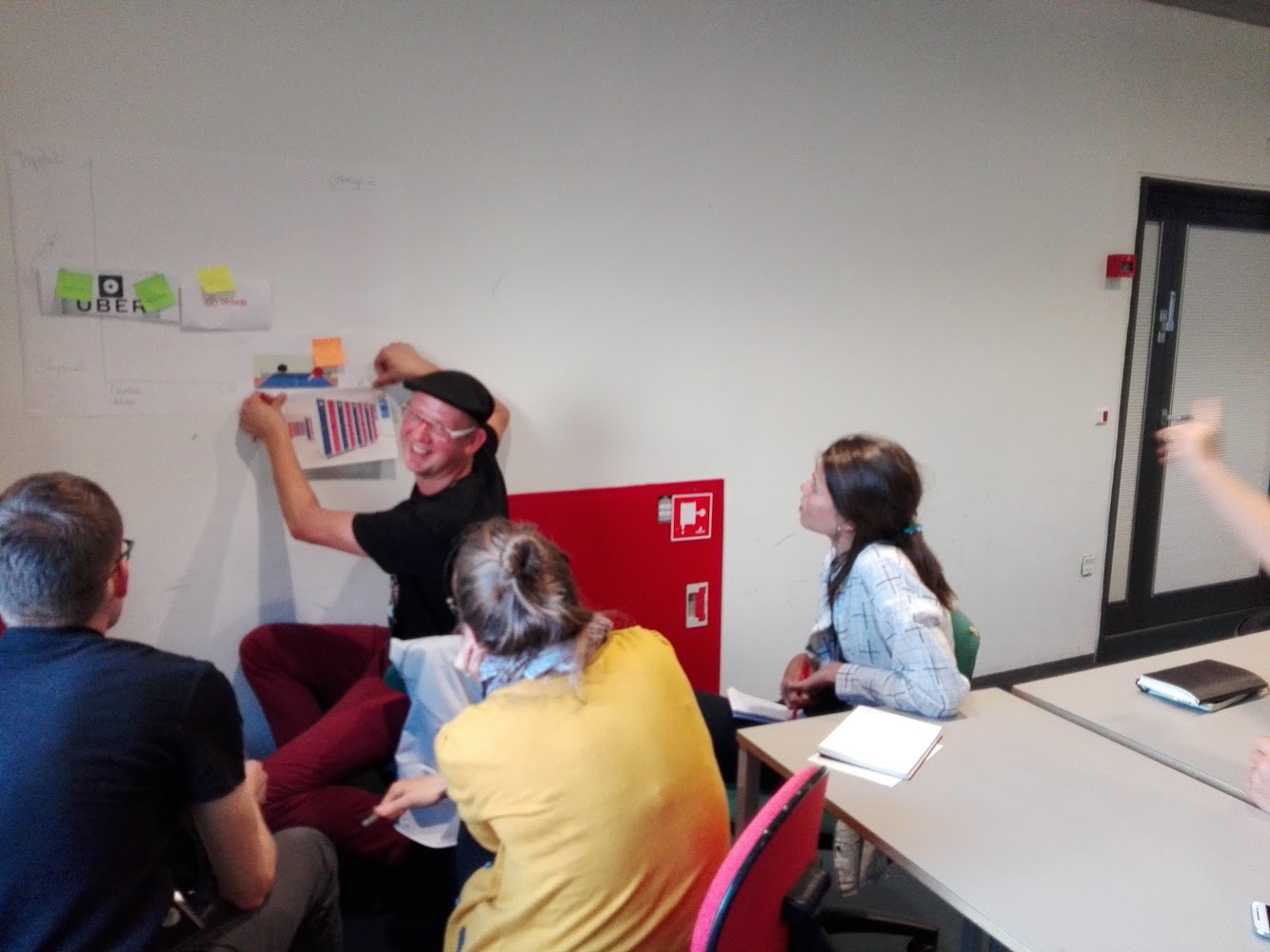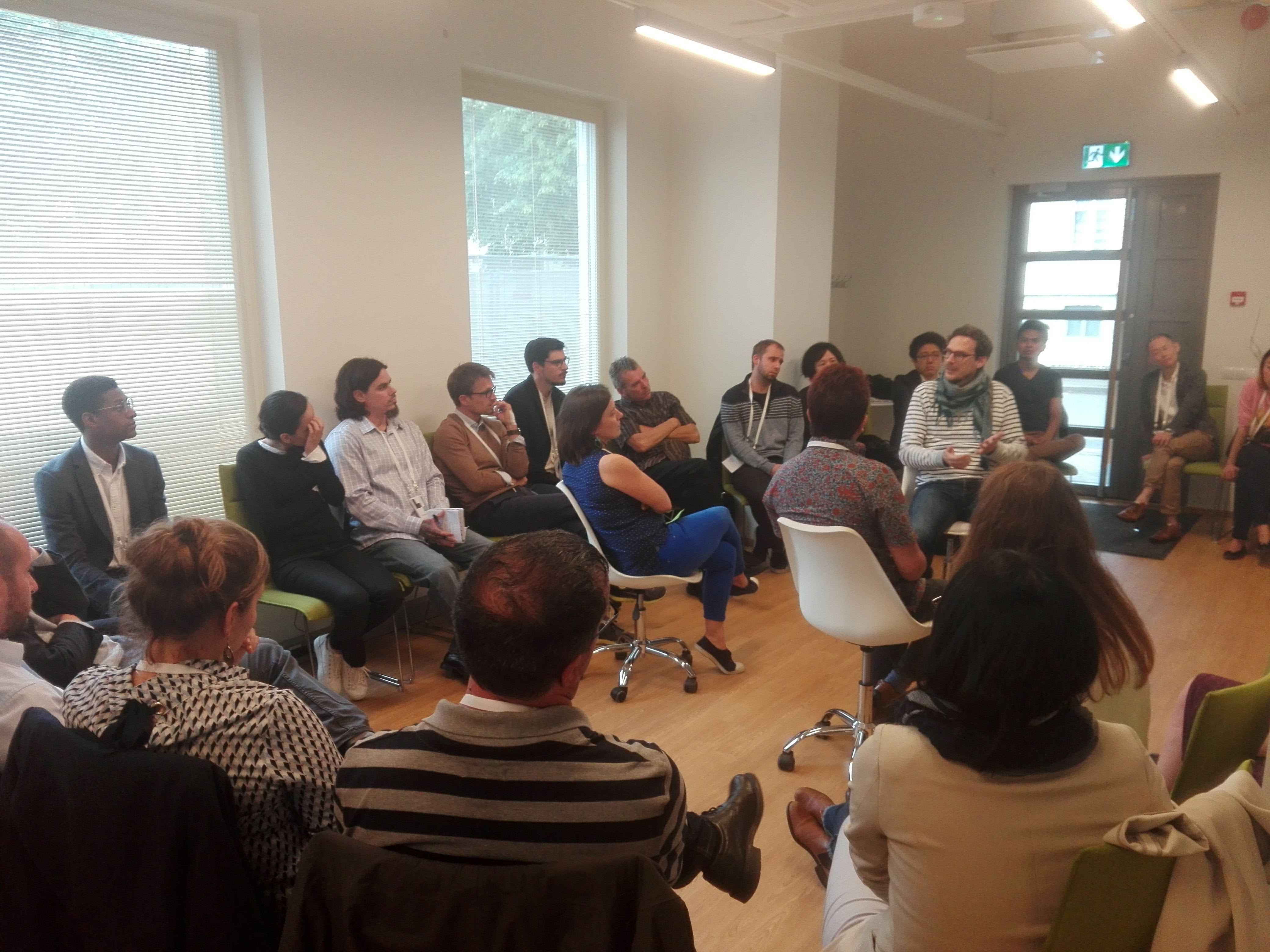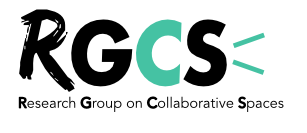By Marie Hasbi (Université Paris II)
Summer is filled with notable academic conferences. For organization researchers, July is particularly notable for holding the annual and big conference of the European Group for Organizational Studies (EGOS), an interdisciplinary event about organizations, organizing and collective activity. As most academic conferences, EGOS colloquia provide a venue for researchers to present and discuss their research papers through sessions and sub-themes.
In 2017, The Research Group on Collaborative Spaces (RGCS) added an event off the track, an unconference called: “Organization & Organizing of the Sharing Economy” (OOSE). I have been part of the organizing committee of the two first sessions in 2017 and 2018.
Behind the Unconference Scene
Each season, through a series of Skype planning meetings, our small group of conveners shared visions about a gathering that might both enhance and criticize the current thinking on the sharing and the peer-to-peer economy. Each time, the implicit guideline question for our group was: Since our topics are related to the New Ways of Working (NWW), how can we gather a new way of conferencing? Unlike traditional conference format that involves passive learning presentations, it was pretty clear to us that a disruptive participant-driven format is more convenient for our unconferences. Once the body of the unconference was organized, settling a location began. In choosing a venue for our unconference, we were keen to situate one part – the workshop- inside walls of the main conference to facilitate the gathering, and we choose to situate the second part outside the walls of the traditional conference to legitimate our act of rebellion. This was a joint venture between the old and the new world of conferencing.
We wanted our unconference to be more inclusive in different ways. We invited keynotes passionate about their topics regardless of their seniority. Finally, following RGCS spirit to expand invitations beyond academia, we created un Eventbrite, we used RGCS diverse media channel, local meetup forums, etc. Our purpose was to reach out a large and diverse audience including practitioners, activists and Egosians about our untraditional unconference (un)doings.
The Unconference Experiences
After nearly two months of organization, our unconference finally opened. My main concern was about participation: how many people will join us? The main conference can involve feelings of physical discomfort caused by travel, dense conference programs, new country and so on. Hence, why people and more particularly Egosians will spend three to four more hours attending an unconference?
Fortunately, I was pleasantly surprised each season to see nearly 60 participants, including entrepreneurs, activists and Egosians, came together to join our unconference. I recognized familiar faces from EGOS and I could put finally faces on names I have been emailing them for weeks about the organization.
In the first unconference, the theme was entitled “Between Autonomy and Control: Contradictions and Paradoxes of the Sharing Economy”. We opened up space for visual co-creation projects and critical conversations and we invited participants to visit a coworking space in Copenhagen. For further details, you can read on RGCS website this post.
In the second unconference, the topic was entitled: «Do it yourself! Exploit yourself? » We challenged traditional spatial arrangements by providing a welcoming Fishbowl platform and we Offred to attendees a tour visits to a hacker space in Tallinn. Here a summary of our second unconference.
During the two seasons, I was astonished in the most positive sense by the genuine, organic and disruptive participation of attendees. I can remember one of my partners in the organization and animation of these unconferences telling me: “look, they are hacking our unconference!”. Both attendees and keynote engagement were wonderful. They were carving out time to argue, debate and to network.

First OSEE: A visual co-creation workshop

Second OOSE: A participant driven Fishbowl debate
What can we learn from these experiences?
After the closing of our unconference, we came together to share a dinner. As the dinner could be an opportunity to share more reflexive conversations, I approached an entrepreneur asking him his feedback on our unconference.
“I really enjoyed the tour visits. Though, I didn’t feel comfortable to share my point of view during the workshop. It is too academic for me...”
What can we do to address this issue? To push the boundaries between academia and practice? Including practitioners in keynotes may work well…Holding our unconference completely outdoor as other RGCS unconferences by experiencing the OWEE protocol (For instance RGCS unconference inside the Academy of Management AOM was held as a walk in the Chicago Millenium Park , RGCS unconference inside AIMS was held in a collaborative space) and therefore get rid of the old world may work too…
Another challenge comes from the comparison between my unconference experience and other events held by RGCS chapters I experienced. How can we create and maintain a sense of community after these unconferences? How can we go beyond the brief and temporary nature of our unconferences?
Looking ahead, we helped to create spaces inside a traditional conference for authentic conversations. Unlike traditional conferences where the status matters, I saw an eclectic mix of researchers practitioners, entrepreneurs and activists walking together in our unconferences, gathering outdoor, sharing laughs and challenging theories and practices.
Overall, the unconference experience and feedback were so positive that we are planning on gathering more unconferences. Why don’t you join us to push the boundaries of traditional conferences? See you next summer at EGOS, AoM, AIMS and other conferences in social sciences and humanities where we intend to extend our experimentations!
I want to thank Albane and Aurore for being my partners for two years in this adventure. A big thanks to François-Xavier for launching and convening with us these unconferences.
References
Kingma, S. F. (2016). The constitution of third workspaces in between the home and the corporate office. New Technology, Work and Employment, 31(2), 176-193
Konzett, C. (2012). Any Questions? Identity Construction in Academic Conference Discussions. Boston,MA :Berlin :De Gruyter Mouton
de Vaujany, FX. & Vitaud, L. (2017). Towards more integrative research practices: introducing Open Walked Event-based Experimentations, LSE Impact Blog, August 30th
de Vaujany, FX. (2016). The diner: How can we explain management research just before dessert?, M@n@gement, Unplugged, vol. 19(4): 330-334
